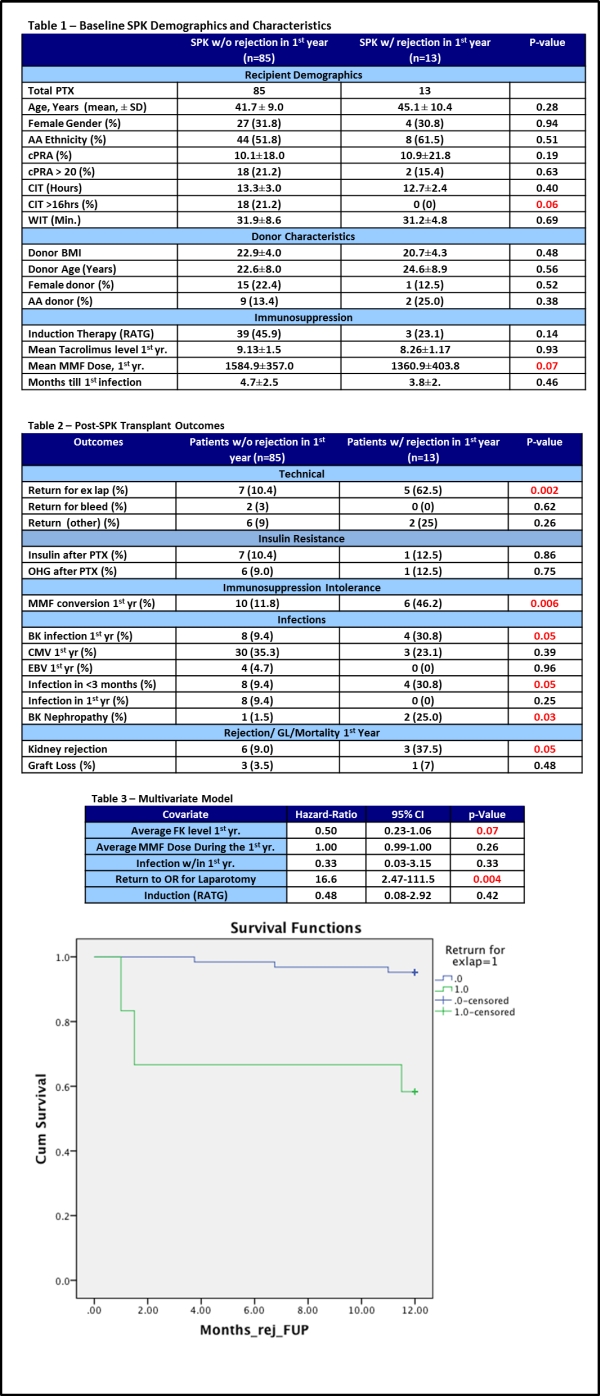Immunosuppression and Reoperation After Simultaneous Kidney Pancreas Transplantation Convey Greatest Risk for Rejection
MUSC, Charleston, SC.
Meeting: 2015 American Transplant Congress
Abstract number: C189
Keywords: Immunosuppression, Outcome, Pancreas transplantation, Rejection
Session Information
Session Name: Poster Session C: More Controversies in Pancreas Transplantation
Session Type: Poster Session
Date: Monday, May 4, 2015
Session Time: 5:30pm-6:30pm
 Presentation Time: 5:30pm-6:30pm
Presentation Time: 5:30pm-6:30pm
Location: Exhibit Hall E
Background: Episodes of acute cellular rejection (ACR) convey significant morbidity after simultaneous kidney and pancreas transplantation (SPK). The role of recipient sensitization, immunosuppression (IS) and infection in ACR has been studied; however, the role of other quality measures such as re-operation remains elusive. Our aim was to define the role of recipient, IS and quality factors in SPK ACR episodes. Methods: Using 8-yr (Jun, 2006-Dec, 2013) cohort, we conducted a retrospective analysis examining demographic, IS, complications and outcomes after SPK in recipients without (Group A; n=85) or with (Group B; n=13) ACR in 1st yr. Maintenance therapy consisted of a tacrolimus-based triple immunosuppressant regimen. Univariate and multivariate analyses were conducted. Results: Total of 109 SPK occurred during this period, of which 98 patients were included in this study (n=85; w/o ACR 1st yr. vs. n= 13 with ACR 1st yr.)). There were no significant differences between groups with respect to age, gender, PRA, CIT, WIT, donor or IS characteristics except CIT> 16 hrs. (p=0.06) and mean MMF dose in 1st yr. (p=0.07, see Table 1). For outcomes, MMF conversion during the 1st yr. (p=0.006), infections (BK viremia, p=0.05, BK nephropathy, p=0.03 and all infections, p=0.05) and kidney ACR (p=0.05) were associated with ACR. Importantly, return to OR conveyed greatest risk for ACR (p=0.002) (Table 2). In multivariate analysis, while mean FK trough level was negatively associated with ACR (HR=0.5, p=0.07), return to OR was the only variable independently associated with ACR (HR=16.6, p=0.004, Table 3). Conclusions: Factors such as maintenance IS, changes to IS and infections impact ACR following SPK. However, quality measures of re-operation appear most significant, conveying 16 times the odds for developing ACR. Further studies may be required to determine the causal chain and optimal IS for patients undergoing reoperation following SPK.
To cite this abstract in AMA style:
Bratton C, Rohan V, Nadig S, Mcgillicuddy J, Chavin K, Baliga P, Taber D. Immunosuppression and Reoperation After Simultaneous Kidney Pancreas Transplantation Convey Greatest Risk for Rejection [abstract]. Am J Transplant. 2015; 15 (suppl 3). https://atcmeetingabstracts.com/abstract/immunosuppression-and-reoperation-after-simultaneous-kidney-pancreas-transplantation-convey-greatest-risk-for-rejection/. Accessed February 15, 2026.« Back to 2015 American Transplant Congress
